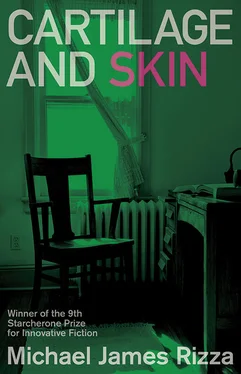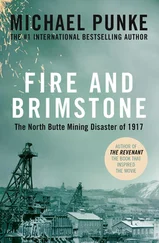“Thanks.” I turned around to see her smiling at me.
“I found a jacket for you.” She was holding a muddy green jacket with brown patches on the elbows.
“Thanks,” I repeated and started toward her in the doorway. “It’s just around the corner, but I’m running out of time.”
“Well, try it on.” Again, she helped me, standing behind me.
Once I had it on, she pulled lightly on the shoulders, checked the length of my sleeves, and ran her hand down my back twice, brushing the coat smooth.
“You’re picture perfect.”
“I left everything in the bathroom. Can I come back for my stuff. I’m just going around the corner.”
“Sure,” she said, moving out of the backroom. “Let it dry out. But we close in about an hour.”
“I should be back by then. If not, you’re open tomorrow, right?”
“No problem.”
She went behind the counter that my coats were spread atop, drew out a calculator and a pad, and began figuring how much I owed her.
“I appreciate this,” I said.
“What’s the worst that can happen? You don’t show up, and I sell your clothes.”
“I’ll be back.”
“After tomorrow, they’re going on the rack.”
Because she was grinning, I couldn’t tell if she was teasing me or not.
“Sounds fair,” I said.
She told me the sum, which was more than I expected, but I paid it without hesitation. When she tore off the receipt, I waved it away, so she folded it in half and dropped it in a wicker pail.
“Are you Crowley?” I asked.
“No, my ex- was a whacky Zeppelin fan.”
In response, I smiled, although her comment made no sense to me.
“He first wanted to call it the Boleskin House, but everyone would have thought we were a bar or something.” She laughed.
“Crowley’s is a good name,” I said.
“A dabbler in sex, drugs, and magic,” she said, which sounded like a bizarre way for her to describe her ex-, but I continued to smile.
I thanked her again, buttoning up the muddy green coat.
She came out from behind the counter to escort me to the door.
The girl on the couch said something to the young man, who answered by saying, “Not until Thursday.” Then they both got up and disappeared into the backroom.
“What is that?” I asked, referring to the back store.
“Oh, just a little extra cash. There’s a solid demand.”
“What is it?”
Pausing before the front door, she looked at me, amused by my naïveté.
“A head shop.”
Seeing that I made no reaction, she clarified: “Paraphernalia, you know, bongs, bowls, dug-outs, for smoking pot.”
“Really?”
“Really,” she mimicked, nodding her head. She pushed up her glasses and then made a gesture that led me to imagine for an instant that she was reaching out her hand to touch me, but instead she pushed open the door.
“Try to stay dry.”
“Thanks.”
I stepped out onto the sidewalk, glancing back at her briefly, before lowering my head and plunging into the cold. In the sudden absence of the incense, jazz, and warmth, and, of course, the soothing presence of the woman, the outside world seemed to be imbued with a starker kind of desolation. In the afterglow of Crowley’s, I felt whatever concern I had for my appointment or for McTeal vanish. I was now about to go through the empty motions of a meaningless charade. I would enact my pantomime, nod where I was obliged to nod, and then — very soon — try to reemerge into life on a warmer, drowsier, more comfortable level.
V
Although the muddy green coat was bulky, it offered little protection from the cold, so I strode at a rapid pace, not bothering to turn my attention toward anything, until I came at last to the glass door, pushed it open, and stepped into the stale mustiness of the stairwell. The social worker’s name wasn’t listed on the wall, but I assumed she was one of the “Associates” of the family counselors on the second floor.
When I reached the top of the stairs, a corridor with a series of closed doors greeted me. The first few were unmarked, and I was slightly disturbed by the thought of having to knock on random doors. Then I saw one labeled as a restroom, with a symbol for handicapped people, although anyone in a wheelchair wasn’t too likely ever to come up those steps. Near the end of the hall was the door I sought. I lightly knocked, perhaps just to signal my entrance, and opened the door.
An elderly woman, who had been concealed behind a formica counter, stood up and asked if she could help me.
“I’m Dr. Parker.”
“Good. Good. Have a seat.” With a pen, she pointed to a pair of black chairs in the corner. There was a small tree growing out of a wicker basket, and a coffee table with several magazines on top of it.
“It’s going to be a few minutes,” she said. “I’m sorry, but I’ll let them know you’re here.”
As I started to remove my coat, the woman left through a doorway beside the counter. I placed the coat on one of the seats and sat down on the other. I attempted to act relaxed. Although I picked up a magazine and looked down at it, I didn’t read a single word because I was thinking: them, them . Who else was I going to see in addition to the weary, tree-shaped social worker? The setting didn’t seem right at all. I seriously doubted that somewhere in this building was a room with a boy who was wasting away on a bed. This wasn’t the white ward of my imagination. Them?
Yet what did it matter if just the social worker and I were to play the game or if twenty other people had parts to perform and noises to mouth? Let them stuff themselves with a sense of their own importance at my expense. Because I was resolved to leave town, everything seemed harmless.
The old woman returned.
“A few minutes,” she said and reclaimed her seat behind the counter, so we couldn’t see one another. She began typing at a furious rate.
After a moment, I returned the magazine to the table and stood up.
“I’ll be right back,” I told the woman, whose typing didn’t cease.
I left the room and headed down the corridor, toward the bathroom. Since it was apparently for both sexes, I knocked and waited for a reply, before opening the door. When I turned on the light, a fan clicked on. A single toilet was surrounded by metal rails bolted to the walls. As I urinated, I read a sign requesting that nothing but toilet paper was to be flushed — a message presumably directed at menstruating women. For some reason, it struck me as a symbol of something, perhaps the last vestige of the infamous female curse, out of which — I imagined — had sprung a whole alternative history of civilization: All the institutions and customs of man positioned their foundations around the bloody scene, which was at once loathsome and mysterious, in need of constant regulation and subversion, particularly during a time when wombs supposedly floated free and when dark, viscous humors, like transmission fluid or oils in a hydraulic pump, governed the functions of the body. Of course, maybe the sign actually symbolized nothing.
Now wasn’t the time for such inane ideas.
Zippering up my gabardine pants, I began to think about Claudia Jones. All my previous notions about her had assumed a new shape after my discovery of “choice bits.” She was no longer simply my bloated-tongued, idiotic neighbor who neglected her mail and hummed Christmas carols on a milkcrate in the alley outside my window. Neither was she any kind of sexual prospect for me — not the listless cow and certainly not the woman wrapped in the purple gauze of ennui, who moved in velvet shadows and waited to surround me with her touch. The real Claudia Jones was something more unsettling and uncanny.
Читать дальше












